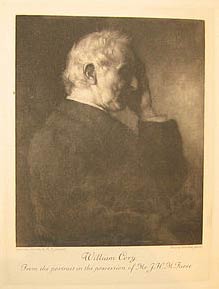Know the master…

A STUDY OF BOYHOOD
So young, and yet so worn with pain!
No sign of youth upon that stooping head,
Save weak half-curls, like beechen boughs that spread
With up-turned edge to catch the hurrying rain;
Such little lint-white locks, as wound
About a mother’s finger long ago,
When he was blither, not more dear, for woe
Was then far off, and other sons stood round.
Not gay, but gracious; plain of speech,
And freely kindling under beauty’s ray,
He dares to speak of what he loves; to-day
He talked of art, and led me on to teach,
All honest, and all delicate:
No room for flattery, no smiles that ask
For tender pleasantries, no looks that mask
The genial impulses of love and hate.
Oh bards that call to bank and glen,
Ye bid me go to nature to be healed!
And lo! a purer fount is here revealed:
My lady-nature dwells in heart of men.
SCHEVENINGEN AVENUE
Oh, that the road were longer,
A mile, or two, or three!
So might the thought grow stronger
That flows from touch of thee.
Oh little slumbering maid,
If thou wert five years older,
Thine head would not be laid
So simply on my shoulder!
Oh, would that I were younger,
Oh, were I more like thee,
I should not faintly hunger
For love that cannot be.
A girl might be caressed,
Beside me freely sitting;
A child on me might rest,
And not like thee, unwitting.
Such honour is thy mother’s
Who smileth on thy sleep,
Or for the nurse who smothers
Thy cheek in kisses deep.
FROM HALS DON TO CHELTENHAM TO TWO LITTLE LADIES.
Across three shires I stretch and lean,
To gaze beyond the hills that screen
The trustful eyes and gracious mien
Of unforgotten Geraldine.
Oh babbler gay as river stickle,
Next year you’ll be too old to tickle;
But while my Torridge flows I’ll say
“Blithe Edith liked me half day.”
A GARDEN GIRL
For when it was Lammastide two before this,
When freshening my face after freshening my lilies,
A door opened quickly, and down fell a kiss,
The lips unforeseen were my passionate Willie’s.
The lad’s mind is rooted, his passion red-fruited,
The head I caressed is another’s delight;
And I, though I stray through the year sorrow-suited,
At Lammas, for Willie’s sake, robe me in white.
TO TWO YOUNG LADIES
There are, I’ve read, two troops of years,
One troop is called the teens;
They bring sweet gifts to little dears,
Ediths and Geraldines.
The others have no certain name,
Though children of the sun,
They come to wrinkled men, and claim
Their treasures one by one.
There is a hermit faint and dry,
In things called rhymes he dabbles,
And seventeen months have heard him sigh
For Cissy and for Babbles.
Once, when he seemed to be bedridden,
These girls said, “Make us lines,”
He tried to court, as he was bidden,
His vanished Valentines.
Is Geraldine in flowing robes?
Has Edith rippling curls?
And do their ears prolong the lobes
Weighed down with gold and pearls?
And do they know the verbs of France?
And do they play duetts?
And do they blush when led to dance?
And are they called coquettes?
Oh, Cissy, if the heartless year
Sets our brief loves asunder!
Oh, Babbles, whom I daren’t call dear!
What can I do but wonder?
I wonder what you’re both become,
Whether you’re children still;
I pause with fingers twain and thumb
Closed on my faltering quill;
These excerpts describe infatuation of older men for pre-adolescent
children and were written around 1860 by William Johnson Cory, one
of the most renowned educators at Eton, when he was around 37 years of age,
ten years before he resigned on allegations of “pederasty” involving a young boy.
Had Gatfol semantic analysis technology
existed, innocence might have been protected
Use Gatfol to find the true meaning of words…
